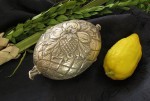It’s good they’re not human
 It’s good that the four plants used on Sukkot are not human.
It’s good that the four plants used on Sukkot are not human.
If they were, they would argue about their precedence and pecking order. They wouldn’t want to sit together or be photographed in each other’s company.
All told they would have a hard job even pretending to be part of the one community.
But since they’re not human we have to presume no lulav has even objected to being bound together with its hadassim and aravot and being held with the etrog.
Human beings find this much more difficult.
It is probably no worse among Jews than among other groups. But Jews have a great ethical tradition and should heed what the Chafetz Chayyim said: “I am grieved that there is dissension and division among Jews. It is a terrible sin - a profanation of the name of God.
“The Talmud states that Rabbi Akiva lost 24,000 students during a plague because, as our rabbis stated, ‘The students did not behave with respect towards each other’. Therefore please have compassion upon yourselves and every Jew in the community, and try to establish peace.
“In this way we will extinguish a fire that could engulf us all.”
This does not mean that anyone is forced to agree with anyone else when issues of conscience divide them. But just as there are four plants on Sukkot, so there should be four principles of harmony:
1. Disagreement should be with civility and derech eretz.
2. What to disagree about should be issues, not personal prestige and precedence.
3. Areas of agreement should be acknowledged and celebrated.
4. Jewish disagreements should not be carried into the general community.



